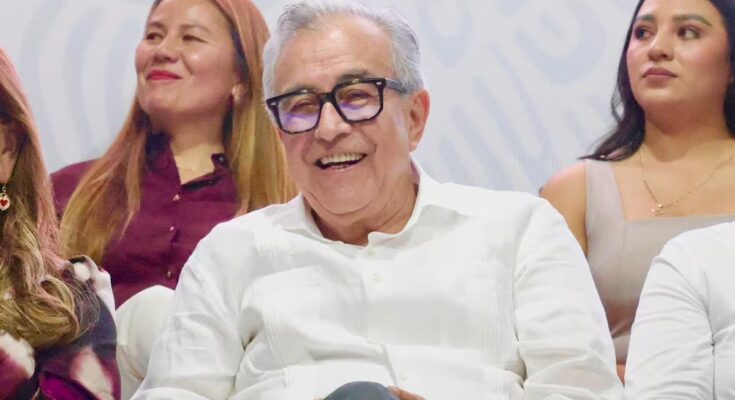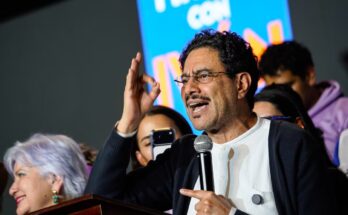The governor of Sinaloa, Rubén Rocha, has become an inconvenient figure for President Claudia Sheinbaum and the ruling Morena party. At the heart of the problem is the way in which the local president has managed the spiral of violence in his state and the wear and tear it has caused on the federal executive, more than a year after the start of the internal war within the Sinaloa cartel, which has left hundreds dead and missing. In addition to the aid and huge resources that the Sheinbaum government has sent directly to that state, the Executive is evaluating the way to manage a crisis that is becoming political. In view of the 2027 legislative elections, in which the governing party will challenge the qualified majority it has in both Houses of Congress, Rocha’s resignation has been on the table on more than one occasion, an option that the president has always rejected, as sources close to Rocha’s maneuvers in Sinaloa confirmed to EL PAÍS. The governor, meanwhile, entrenches himself and never misses an opportunity to underline that he has always had the support of the former president and founder of Morena, Andrés Manuel López Obrador.
Sinaloa was already a fire when Sheinbaum took office as president of Mexico in October last year. The all-out war between the Los Chapitos and La Mayiza factions has thrown the state into its worst insecurity crisis. The problem was compounded by several stumbles by Rocha. First, Ishmael May Zambada, leader of the Sinaloa Cartel, spoke of a meeting he was due to attend with the governor and Héctor Melesio Cuén, a politician with much local influence and an opponent of Rocha. In that alleged meeting, El Mayo was kidnapped – and then handed over to the United States – and Cuén was murdered. In a shady way, the Public Prosecutor’s Office tried to cover up Cuén’s murder, until the General Prosecutor’s Office intervened and dismantled the façade. Surrounded by shadow, Rocha denied El Mayo’s accusations and won the unlimited support of former president Andrés Manuel López Obrador, who had to manage the crisis in Sinaloa in the final months of his six-year term. Calm was far from arriving. Rocha made highly controversial statements, for example, claiming that Sinaloa was “perfectly fine” and that the population lived in calm and tranquility, which sparked social outrage in his state.
Already in power, Sheinbaum conceived a control strategy that consisted of sending his strongman, the secretary of federal security, Omar García Harfuch, directly to Sinaloa to coordinate crime-fighting efforts, with the Armed Forces and local businesses under his command. The result was dozens of arrests of hitmen and multiple seizures of drugs and laboratories. The president, ever aware of the strategy, visited Sinaloa and declared that neither the people nor the president were alone. Rocha has used signals of support from the Executive, both López Obrador and Sheinbaum, as a political resource to validate his management. But it wasn’t a blank check at all, at least in the president’s case.
In the first days of January, voices increased within the ruling party and the government that, internally, they wanted Rocha to leave. On more than one occasion, high-level leaders sent Rocha the message that it was best for him to resign, as his image was beginning to impact the image of the Federal Executive and, worse still, the governability of the entire country. Sheinbaum had launched Operation Northern Border as a bargaining chip with Donald Trump, who, as soon as he assumed the presidency of the United States, had launched a huge economic offensive against Mexico due to the drug trafficking problem.
Rocha not only did not accept any of the requests for attention, which were presented to him as a suggestion and not an instruction, according to the sources. In contrast, the governor, described as a very difficult politician, said he was in office because the Sinhalese wanted him that way, in reference to the 2021 elections in which he was elected. More than once he has been asked to request a leave of absence from office and has been asked, for example, to undergo a consultation to revoke his mandate, in which he could even be favored if the population ratifies it, the sources add. This newspaper asked the governor, through a spokesperson, for comment on these calls for resignation, but did not hear back.
Less than two years after the end of his mandate, Rocha responded in recent days to political pressure from the ruling party with a big gamble. In a public event at the Culiacán International Book Fair, he assured that his candidacy for governor of Morena was directly due to López Obrador. According to his story, as part of Morena’s internal campaign to define the candidates, the winner of the Sinaloa poll had not been him, but Luis Guillermo Benítez Torres, alias The chemistthe strongest contender. However, he said, the then president intervened so that the ruling party gave him victory. Between the lines, Rocha used all of López Obrador’s political weight as a bulwark. If before he claimed that it was due to the people of Sinaloa, now he insinuates that it was due to the greatest leader of Morena.
According to the audio of that speech to FIL, to which EL PAÍS had access, Rocha spoke of a meeting with López Obrador, in which the president himself confessed how he intervened in the internal process to favor him. They met in a military zone in Culiacán, capital of Sinaloa (Rocha was already president). “President Andrés Manuel told me: ‘I don’t know how you were a senator, but I know how you were a governor.'” Then, according to his story, the president told him that he had reviewed the polls and, seeing that Rocha was the most popular in voting intentions, decided that he would be the standard-bearer of his party. Rocha emphasized to the public that he had this confidence because he did not believe that López Obrador, who had retreated from public life for a year, would call him to complain. The audience burst into laughter.
The politicians who were then part of the Morenoist leadership, and who knew the polls to define the candidacies, deny that the former president had any intervention in the Rocha issue. In any case, they claim, it was an operation by Mario Delgado, the then leader of the cherry formation. Delgado, in effect, shot down the aspirations of The chemist Benítez, who won the poll, denounced accusations of gender-based political violence against him. This newspaper contacted Delgado, the current Minister of Education, to ask for a position on the accusations made public by Rocha, but he did not respond to the request.
The explanation of why the president and Morena do not force Rocha to resign is, according to the sources consulted, purely pragmatic and boils down to the political strategy of preserving the qualified majority in the two houses of Congress. In the Senate, where the ruling party has a very slim qualified majority, Rocha has a direct link with Senator Enrique Insunza. If the governor put Insunza against the majority, Morena’s reform plans would be at great risk. In the Chamber of Deputies, even if the cherry steamroller is more flexible and Rocha has little influence among Sinaloa’s legislators, his close friendship with Ricardo Monreal, the coordinator of the entire Moraine faction, is even more important. Their bond is such that, according to the president of the FIL of Culiacán, it was Monreal who gave him the news that he would be the candidate despite the unfavorable forecasts.
Entrenched in his state and leaning on the shoulders of López Obrador, Rocha has bought time to remain in the governorship at all costs. Within Morena there are many uncomfortable characters, with scandals that damage the reputation of the Guinda party, founded by its leader on the ideals of austerity and honesty. The question is whether other morenistas questioned will follow the same path laid out by Rocha, asserting their influence on federal lawmakers to put pressure on the president and the party in power. Morena navigates between her principles and political pragmatism.



